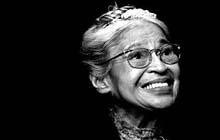Advertisement
Remembering Rosa Parks
Resume
On December 1st, 1955, in Montgomery, Alabama, a black seamstress finished with her day of work, caught a city bus, and headed home. Three stops later, a white man got on the bus and had to stand. Montgomery and this country's rules at that time required that blacks rise to let the white man sit, and let him sit alone. Rosa Parks refused.
Her refusal, and the court cases that followed, and the bus boycott led by young Martin Luther King that followed, sparked a revolution in American race relations. Last night, Rosa Parks, icon of the civil rights movement, died at 92 in Detroit. She left behind a changed nation, but not completely changed.
Hear about the legacy of Rosa Parks, and the unfinished revolution on race in America.
Guests:
Robert Pratt, Professor of African-American History at the University of Georgia
Kwame Fitzpatrick, Mayor of Detroit
Douglas Brinkley, distinguished professor of history and director of the Theodore Roosevelt Center for American Civilization at Tulane University, author of "Rosa Parks"
Michael Eric Dyson,Avalon Foundation Professor in the Humanities at the University of Pennsylvania, author of
" Why I Love Black Women"
Dorothy Height, former president of the National Council of Negro WomenMary Frances Berry, former chair of the U.S. Commission on Civil Rights
This program aired on October 25, 2005.